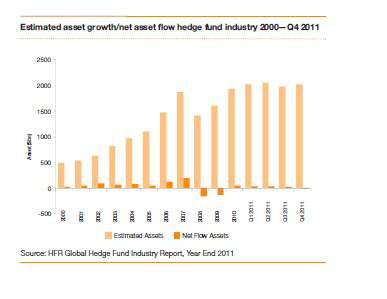Hedge funds need to earn the trust of their investors. According to a new white paper from PricewaterhouseCoopers, “From Black Box to Open Book,” there are five keys to accomplishing this:
- Alignment of interests across the value chain;
- Standardization of investor reporting and operational due diligence (though this standardization has to be balanced with customization);
- High quality infrastructure and controls;
- Independence of administrators and auditors; and
- High governance standards.
One premise of much of the analysis is that the role within the investor base of the high-net worth individual (who might conceivably once have been dazzled by the star quality of the names on a letterhead) is lessening. The paper quotes Richard H. Baker, CEO of the Managed Funds Association, saying: “Institutional investor assets now represent the majority of the sector’s global assets, and the sector has made a strong effort to respond to their requests for greater transparency and more detailed reporting.”
It isn’t just barely a “majority” either! Deutsche Bank’s Tenth Annual Alternative Investment Survey indicates that institutions now account for two thirds of hedge fund assets, although in 2003 they accounted for only 20 percent thereof.
Meanwhile the total of those assets has recovered from the plunge it tool in 2007-08. It is now above pre-crisis levels.
But the return of assets comes with an enhanced scrutiny. Todd Groome, chairman of AIMA, says: “Following 2008, a much greater investor focus on liquidity, portfolio transparency, control and fund governance was clearly evident.” In common with legislative/regulatory changes, this requires transformation.
Let’s turn to the five items listed above.
Interests Aligned
This will have to be more than just lip service or a redescription of the usual presentations. TJ Carlson, of Kentucky Retirement Systems, says that investors such as KRS want “direct contact with personnel that are actually doing the work.” They want to be able to talk to the people in the back office about controls, processes, and price verification. They will want a partnership in a process-driven sense.
Standardization
In September 2011, an industry working group put out its new Open Protocol Enabling Risk Aggregation standards. These propose consistent practices for the collection and presentation of risk information.
In a comment letter to the Securities and Exchange Commission, the working group had suggested what it called the “harmony” solution for the Form PF, which would be for the world’s regulatory authorities to use the same format the working group is proposing for the same data, with fill ins for regional variation. The SEC and the Commodity Futures Trading Commission as well, were moving in that direction by October.
Infrastructure
PwC says that managers today “are investing in upgrading technology platforms in order to meet investors’ and regulators’ mounting demands for reporting.”
Often a technology system becomes a patchwork, because as a firm grows it meets the quarter-to-quarter demands as they arise, and the relevant technology is changing at least as quickly as the investing environment is. But there is a greater understanding of late that the patchwork of legacy systems is not optimal, and overhauls may well be justified.
Unfortunately, the expense of an optimal technology infrastructure may raise barriers to entry “and in this sense might dampen the sector’s entrepreneurial vigor and development of new talent.”
Independence
Independent administrators play an important part in the developing post-crisis world, what PwC calls, in a node to President Reagan, calls the trust-but-verify world.
Investors want a greater role for independent administrators in such matters as the verification of the net asset value.
Unfortunately, this results in costly duplication of efforts, when hedge fund managers distrust the administrators’ abilities, and end up shadowing the administrators with an in-house team.. Some managers (not all) “expect to scale back what they’ve built over time [for purposes of such shadowing] as credibility is enhanced and confidence grows with positive experience.”
Governance
Questions of governance are among the hottest hedge fund related topics going globally, PwC says. The word “globally” in such a statement emphatically includes the Cayman Islands, Dublin, and Luxembourg. Indeed, the Cayman Grand Court contributed to the discussion last November with a ruling that the directors of Weavering Capital had aided fraud.
The report quotes Don Seymour, the managing director of dms Offshore Investment Services Ltd., who has said, “Institutional investors and other stakeholders want directors to be independent guardians of their assets – with the motivation, time, and qualifications to perform this role.”
It will no longer be sufficient, then, for board members simply to follow a pre-established agenda, sign the documents their lawyers put in front of them, and adjourn without adding any value. PwC expects that standard codes and practices will prevail, and that they will significantly improve governance.
